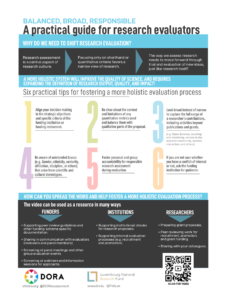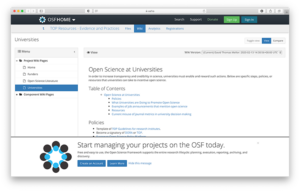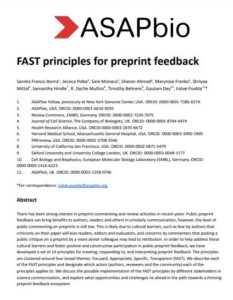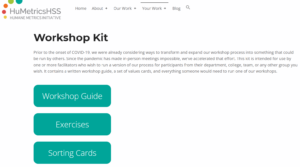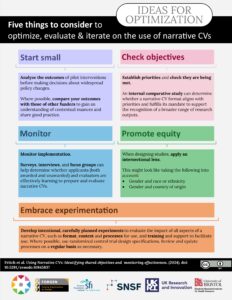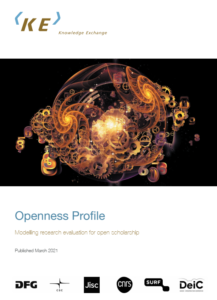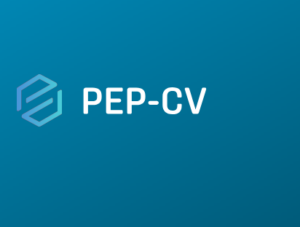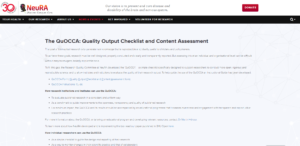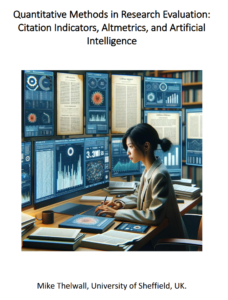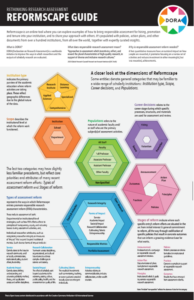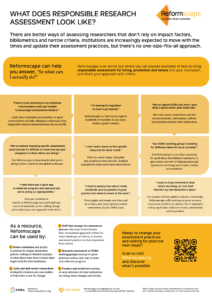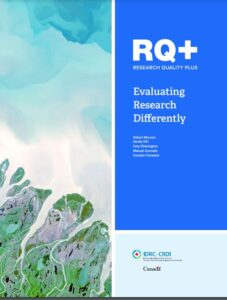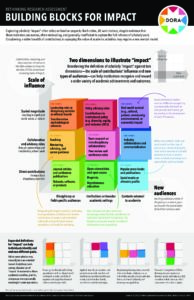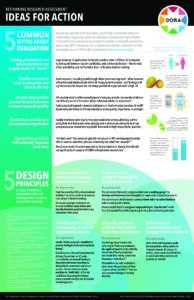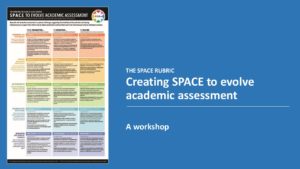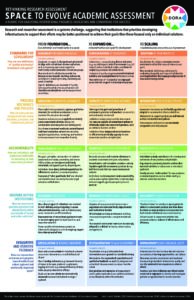A collection of materials to facilitate the development of responsible research and researcher assessment policies and practices.
Search and Filter
Resource type
Intended audience
Tools
ASAPbio (Accelerating Science and Publication in Biology) tracks preprint policies and practices at journals, funders, and universities.
Advocacy resourcesTools
DORA-produced
For: Funders
This is part of DORA’s toolkit of resources to support academic institutions that are improving their policies and practices. Find the other resources in the toolkit here. Balanced, broad, responsible: A practical guide for research evaluators is a short, informative video that is accompanied by a one-page brief. The video and document are meant…
Tools
The Center for Open Science has a collection of open science policies at universities and examples of job announcements that mention open science. The Open Science Framework (OSF) also has a project that archives job offers that require or suggest an open science statement from applicants.
Good practicesTools
For: FundersResearch institutes
2021
CIRAD developed the ImpresS method to assess the environmental and societal impact its research.
Tools
For: Journals and publishersResearch institutes
2022
Preprints are an essential tool for accelerating scientific discovery as they provide early and free access to new findings. Since the COVID-19 pandemic, the usage of preprints have surged on a worldwide level and its availability allows discussion and assessment to be carried over to a wider community. However public participation is very low and…
Tools
For: Research institutes
The Humane Metrics Initiative (HuMetricsHSS) works to create and support values-enacted frameworks for understanding and evaluating all aspects of scholarly life with a focus on humanities and social sciences . Towards its goal of supporting stakeholders as they work to reform scholarly evaluation, HuMetricsHSS created a Workshop Kit to aid those who would like to…
Tools
DORA-produced
For: FundersResearch institutes
2024
This one-page tip sheet is a part of the short report Using Narrative CVs: Identifying shared objectives and monitoring effectiveness. In February 2022, DORA organized the online workshop series “Using Narrative CVs: Identifying shared objectives and monitoring effectiveness” in partnership with FORGEN CoP, Science Foundation Ireland, the Swiss National Science Foundation, UK Research and Innovation,…
Good practicesPosition papersTools
For: FundersResearch institutes
2016
The IDRC in Canada developed a tool called Research Quality Plus (RQ+) to assess applied and translational research.
Position papersTools
For: FundersResearch institutes
2021
This is a report that describes mechanisms and approaches to improve and incentivize the recording, the evaluation, and the recognition of contributions to Open Scholarship practice. It presents a digital resource called the Openness Profile (OP) and describes how the OP can help address existing gaps in the assessment of open science. Developed by consultants…
Tools
The Metrics Toolkit is an online resource that provides information about research metrics across scholarly disciplines to help educate individuals in the academic community.
Tools
For: FundersProfessional societies
2024
The Peer Exchange Platform for Narrative-style CVs (PEP-CV) is a free and open resource for everyone in research and innovation to add to existing guidance on narrative CVs. As a not-for-profit initiative, the PEP-CV platform is a collaborative effort among funders, institutions, and researchers that fosters a culture of collaboration, mutual learning, and expands national…
Tools
For: FundersJournals and publishersResearch institutes
2022
The Research Quality Committee at Neuroscience Research Australia (NeuRA) has developed a new tool to assess and improve scientific research quality and reproducibility: Quality Output Checklist and Content Assessment (QuOCCA) The QuOCCA was designed after extensive research and feedback from external experts and researchers. The QuOCCA was specifically created to assess a broad spectrum of…
Advocacy resourcesInitiativesTools
For: FundersJournals and publishersResearch institutes
This book critically analyses the value of citation data, altmetrics, and artificial intelligence to support the research evaluation of articles, scholars, departments, universities, countries, and funders. It introduces and discusses indicators that can support research evaluation and analyses their strengths and weaknesses as well as the generic strengths and weaknesses of the use of indicators…
Policies and guidanceTools
DORA-produced
For: Research institutes
2024
A one page tool that describes the six ways that entries are characterized in the Reformscape dataset. 1. Institution type. 2. Scope. 3. Populations. 4. Career decision. 5. Type of assessment reform. 6. Stages of reform. Part of "Rethinking research assessment" series.
Tools
DORA-produced
For: Research institutes
2024
This small, letter-sized poster (A4 paper) describes how you can use Reformscape to explore examples of responsible research assessment and help visualize what changes in policy toward responsible research assessment look like. This poster provides nine possible situations in which Reformscape can provide information, and describes five groups who might want to use Reformscape. DORA.…
Tools
For: FundersJournals and publishers
2022
The International Development Research Centre (IDRC) in Canada developed a tool called Research Quality Plus (RQ+) to assess and improve quality of research . The three tenets of RQ+ approach are: identify contexts of research, quality is multi-dimensional, and use of rubrics for systematic and empirical appraisal. RQ+ Approach has five major applications: Priority Setting:…
Good practicesTools
For: FundersResearch institutes
In 2022 Trinity College Dublin launched The Researcher Impact Framework (RIF), a tool designed to help researchers understand and communicate the impact of their work in four key areas: Knowledge generation Development of others and collaborations Contribution to the research community Addressing broader societal challenges The RIF originated from Trinity College Dublin’s Research Impact Pilot…
Tools
For: FundersResearch institutes
The Résumé for Researchers is a tool developed by the Royal Society to help support the evaluation and assessment of individuals’ varied research contributions.
Advocacy resourcesTools
DORA-produced
For: Research institutes
This is part of DORA’s toolkit of resources to support academic institutions that are improving their policies and practices. Find the other resources in the toolkit here. Building Blocks for Impact is a one-pager that outlines and illustrates the wide variety of academic achievements and outcomes that could be considered “impactful”. This model visualizes “impact” on…
Advocacy resourcesTools
DORA-produced
For: Research institutes
This is part of DORA’s toolkit of resources to support academic institutions that are improving their policies and practices. Find the other resources in the toolkit here. Debiasing Committee Composition and Deliberative Processes is a one-page brief that identifies strategies for including more perspectives and reducing biases in the evaluation processes for hiring, promotion, tenure, and…
Advocacy resourcesTools
DORA-produced
Ideas for Action outlines five common myths about research evaluation to help universities better understand barriers to change and provides analogous examples to illustrate how these myths exist inside and outside of academia.
Advocacy resourcesTools
DORA-produced
Unintended Cognitive and Systems Biases identifies seven personal biases that can influence hiring, promotion, and tenure decisions.
Advocacy resourcesTools
DORA-produced
For: Research institutes
This is part of DORA’s toolkit of resources to support academic institutions that are improving their policies and practices. Find the other resources in the toolkit here. With thanks to volunteers in the DORA community, most resources in the workshop kit are also available in Spanish. See below. This kit is intended to equip organizers…
Advocacy resourcesTools
DORA-produced
For: Research institutes
This is part of DORA’s toolkit of resources to support academic institutions that are improving their policies and practices. Find the other resources in the toolkit here. With thanks to volunteers in the DORA community, SPACE is also available in Catalan and Spanish. See below. Improving research and scholarship assessment practices requires the ability to…
Tools
For: FundersResearch institutes
2022
Reporting of who did what is important to give researchers the credit they deserve. Standards like CRediT (the Contributor Roles Taxonomy) allow authors’ contributions to a research paper to be published in a machine-readable format. Surfacing researcher contributions is important for assembling future teams, as well as for the assessment of researchers. tenzing, a free…


